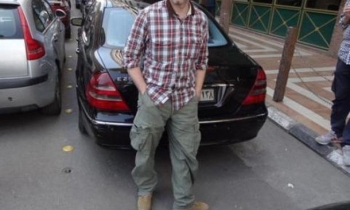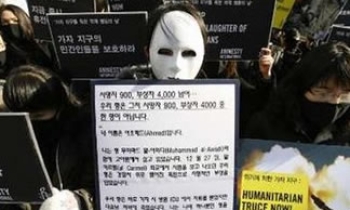Press freedom and human rights groups around the world have expressed outrage at the death in custody of Radio Free Europe / Radio Liberty (RFE/RL) journalist Ogulsapar Muradova. Muradova, 58, died in prison in Turkmenistan with reported injuries to her head, RFE/RL said.

A relative reported the news Thursday after family members were asked by officials to identify her body in a mortuary in capital Ashgabat. Her children were quoted as saying the body has "marks on the neck" and a "large wound" on the head. Turkmen officials reportedly said she had died of "natural causes". She was also associated with the Turkmenistan Helsinki Foundation, a Bulgaria-based nongovernmental organisation that monitors and reports on human rights conditions in Turkmenistan.
The Office of the United Nations High Commissioner for Human Rights (OHCHR) Friday expressed serious concern about the recent death of Muradova, and urged the country's authorities to launch a full and independent investigation into what happened.
At a press briefing in Geneva, OHCHR spokesman José Luis DÃaz said the agency was "very disturbed" about the death of Ogulsapa Muradova. He also expressed concern about the fate of two other people who were convicted on the same charges at the same time and remain in custody. DÃaz urged Turkmen authorities to conduct a thorough, prompt and independent investigation into the cause of Muradova's death, including an independent medical examination of the body, and to make the findings public.
Muradova was arrested on June 18, together with Amandurdy Amanklychev and Sapardurdy Khajiev, who are also associated with the Turkmenistan Helsinki Foundation. The government at first implied that their human rights and journalism work were instead acts of subversion. In late August a court convicted all three of illegal weapons possession in a two-hour closed trial and sentenced Muradova to six years in prison, and Amanklychev and Khajiev to seven years each. Muradova was held incommunicado throughout her detention, as are Amanklychev and Khajiev to this day.
The Committee to Protect Journalists (CPJ) Thursday called for an inquiry into Muradova's death. "We mourn the death of our colleague Ogulsapar Muradova," said CPJ Executive Director Joel Simon. "Authorities have not yet made public the time and cause of death but their secretive conduct, combined with unofficial accounts of wounds found on her body, raise suspicions of foul play."
"Turkmenistan is one of the most repressive countries in the world and the death of Ogulsapar raises suspicion that she was killed," said Oliver Money-Kyrle, International Federation of Journalists (IFJ) Programmes Director. "The lack of regard and impunity with which the Turkmenistan authorities treat independent media is a political scandal. Even so we call on the government to carry out a full and extensive investigation into this killing and to bring those responsible for justice."

"It is essential that the international community, especially the European countries, the United States and Russia, should demand to know what happened," Reporters sans Frontières (RSF) said. "Impunity and indifference are the worst form to treatment for journalists who fall victim to the enemies of press freedom and for their relatives."
In a statement issued on September 14, RSF urged the international community – "especially the European countries, the United States, and Russia" – to demand that Turkmen authorities explain the circumstances of Muradova's death. The same day, RSF organised a protest rally outside the Turkmen Embassy in Paris. Some 30 group members and journalists briefly entered the embassy, demanding to see the ambassador. French police removed them without violence; it was unclear whether the Turkmen envoy met with any of the protesters.
"Muradova should never have been in prison in the first place," said Holly Cartner, Europe and Central Asia director for Human Rights Watch (HRW). "Her death was more than a tragedy – it may have been a crime." HRW called on the international community to press for an international, independent forensic examination of Muradova's body as a matter of urgent priority in order to establish the cause of her death.
The Turkmen Helsinki Foundation (THF) said that Muradova's body showed a large head wound and bruises around the neck. It spoke to her adult children Sona and Maral before the telephones were cut. RFE/RL's Narodetsky also said that the children reported that their mother had a head wound. The THF statement said Muradova had been drugged in jail, tortured, and coerced to confess to "illegal activities."
THF chairperson Tajigul Begmedova said there was no doubt in her mind that Muradova was killed. "We're confronted with the active political assassination of Ogulsapar Muradova," she said. "We have every reason to say that [she] died of a violent death after being tortured and offended."
Aaron Rhodes, the executive director of the Vienna-based International Helsinki Federation for Human Rights (IHF), also said he believes Muradova died violently. "It appears that she has been summarily executed by the authorities, which she certainly doesn't deserve, and nobody does," he said, acording to RFE/RL.

Human Rights Watch urged the newly-established United Nations Human Rights Council, which convenes in Geneva for its second session next week, to take up Turkmenistan for critical scrutiny. It also criticised the European Union for not staying true to its human rights principles by pursuing an interim trade agreement with the Turkmen government.
"Muradova's death shows just how absurd it is of the EU to even contemplate such an agreement with the Turkmen government," said Cartner. "Instead of seeking to upgrade relations with this stronghold of repression, the EU should redouble efforts to press the authorities to make concrete and meaningful progress in human rights."
The Organization for Security and Cooperation in Europe (OSCE) has called upon Turkmen authorities to shed light on Muradova's death. Miklos Haraszti, the OSCE Representative on Freedom of the Media, told RFE/RL's Turkmen Service that he was "quite shaken" and "very sad" by news of the journalist's death.
"[On September 14] I contacted the [Turkmen] authorities and asked them to handle this death in a transparent way in providing information about all the circumstances surrounding [Muradova's] death," he said. Haraszti also said he regretted that Muradova did not have time to appeal the court decision that sentenced her to jail.
US government-funded RFE/RL was the last foreign broadcaster to maintain a network of correspondents in the secretive Central Asian state, which is tightly controlled by Saparmurat Niyazov, declared president for life in 1999.

Turkmenistan remains one of the most repressive and closed countries in the world. The government tolerates no dissent, allows no media or political freedoms, and has driven into exile or imprisoned political opposition, human rights defenders and independent journalists. Dissidents are treated as criminals and are subject to internal exile, forced eviction from their homes and confiscation of their personal property. Several have been forcibly detained in psychiatric hospitals.
The government has banned opera, ballet, circus, the philharmonic orchestra and non-Turkmen cultural associations. Religious believers, particularly followers of faiths other than Sunni Islam and Russian Orthodoxy, have faced criminal prosecution, police beatings, deportation and, in some cases, demolition of their houses of worship.
Turkmenistan is a country whose leadership is sending it backwards in social and economic development. The country is rich in natural gas, but most of the population lives in grinding poverty. In 2004, President Niyazov was reported to have ordered the dismissal of an estimated 15,000 healthcare workers and replaced them with military conscripts. In 2003, the government limited compulsory education to nine years, and it has cut back drastically on state-funded healthcare.









